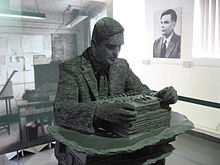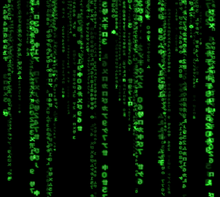James H. Wilkinson
Appearance
James Hardy Wilkinson (27 September 1919 – 5 October 1986) was a prominent figure in the field of numerical analysis, a field at the boundary of applied mathematics and computer science particularly useful to physics and engineering. He worked with Alan Turing at the National Physical Laboratory in the early days of the development of electronic computers (1946–1948).
Quotes
[edit]
- Very belatedly in 1947, Darwin [Sir Charles Darwin, great-grandson of the famous Charles Darwin] agreed to set up a very small electronics group [...] It was not easy to have the imagination to foresee that computers were to become one of the most important developments of the century.
- Oral history interview by John C. Nash, SIAM History of Numerical Analysis and Scientific Computing Project[1], 13 July 1984
Some Comments from a Numerical Analyst (1971)
[edit]- 1970 Turing Award lecture [2], Journal of the ACM 18:2 (February 1971), pp. 137–147

- Turing had a strong predeliction for working things out from first principles, usually in the first instance without consulting any previous work on the subject, and no doubt it was this habit which gave his work that characteristically original flavor. I was reminded of a remark which Beethoven is reputed to have made when he was asked if he had heard a certain work of Mozart which was attracting much attention. He replied that he had not, and added "neither shall I do so, lest I forfeit some of my own originality."
- He [Turing] was particularly fond of little programming tricks (some people would say that he was too fond of them to be a "good" programmer) and would chuckle with boyish good humor at any little tricks I may have used.
- Numerical analysis has begun to look a little square in the computer science setting, and numerical analysts are beginning to show signs of losing faith in themselves. Their sense of isolation is accentuated by the present trend towards abstraction in mathematics departments which makes for an uneasy relationship. How different things might have been if the computer revolution had taken place in the 19th century! [...] In any case "numerical analysts" may be likened to "The Establishment" in computer science and in all spheres it is fashionable to diagnose "rigor morris" in the Establishment.
- Of course everything in computerology is new; that is at once its attraction, and its weakness. Only recently I learned that computers are revolutionizing astrology. Horoscopes by computer!
- In the early days of the computer revolution computer designers and numerical analysts worked closely together and indeed were often the same people. Now there is a regrettable tendency for numerical analysts to opt out of any responsibility for the design of the arithmetic facilities and a failure to influence the more basic features of software. It is often said that the use of computers for scientific work represents a small part of the market and numerical analysts have resigned themselves to accepting facilities "designed" for other purposes and making the best of them. [...] One of the main virtues of an electronic computer from the point of view of the numerical analyst is its ability to "do arithmetic fast." Need the arithmetic be so bad!

